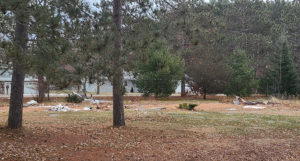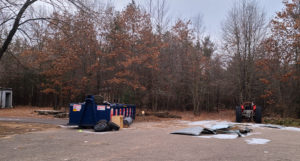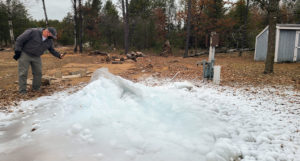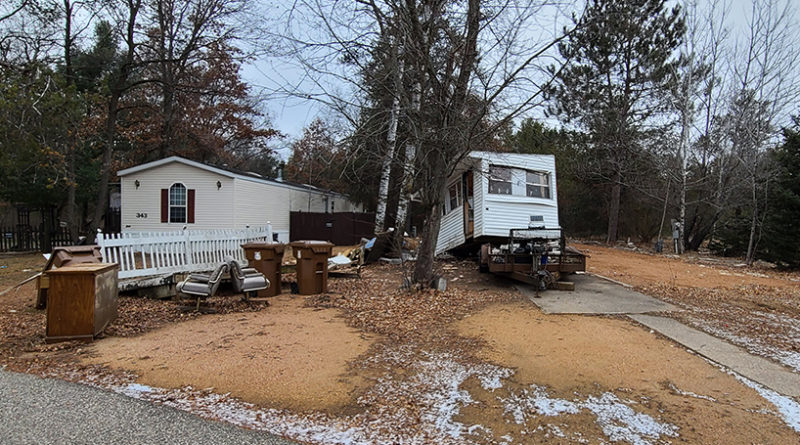Editorial: It’s time for the city council to put Four Seasons on a public agenda
By Brandi Makuski
It’s time for the Stevens Point City Council to bring Four Seasons Mobile Home Park up for discussion during a public council meeting.
The council, and more specifically, Alderman Thomas Leek of District 8, where the park is located, should personally invite the 20 or so remaining residents of the park—which these days is more of a stereotypical “trailer park” than it is a mobile home community—to speak to the council about their experiences living at 1430 Torun Rd., and dealing with the property owner, Christopher Reeves.
Four Seasons has become well-known to police as a haven for squatters, illegal dumping, drugs, and other criminal activity in recent years. It is also a hotspot for the city’s recently-expanded community development department to issue property maintenance violations and raze orders for mobile homes that are no longer safe for human habitation.

The park also became infamous during widespread and intense media coverage last spring. In April 2019, park residents received their first water disconnection notice from the city due to nonpayment of the park’s water bill by Reeves. In June, they received a second notice that Reeves was late with the payment, and a disconnection was scheduled within 72 hours.
On both occasions, Reeves made the payment in time to avert disconnection. But two notices in three months, along with residents’ reported inability to contact Reeves, was enough to chase many of the park residents out, at least those who could afford to move.
In early December, two significant leaks were reported at the park; one could be seen from the roadway, another causing low water pressure, and allowing for the potential of particulates to enter the public water supply. After Reeves would not, or could not, address the repairs in a timely manner, the city hired a contractor.
A third significant leak was reported to the city’s water department last Wednesday. At present, it doesn’t appear to be causing any public safety issues, so the leak continues today.
It’s not clear why the park is so poorly managed, although some city staff members say Reeves’ property manager recently quit, and emails obtained by the Metro Wire via open records request show that Reeves is often vulgar and verbally abusive in his communication with the city.
Following a massive turnover in city government in 2015—seven new city council members and a new mayor all at once—Stevens Point made property maintenance a high priority. Since then, many ordinances have been either introduced or reworded, with new positions created in the community development department to support their enforcement.
Community development’s inspection department saw a 16.29 percent increase in its budget for 2019. It is the single largest increase in any general government office budget last year. By comparison, the fire department saw a 3.96 percent increase, the parks department got a 3.50 percent increase, and the police department received a .10 percent bump, for the same year.
Council members championed the increase in property maintenance oversight, with some regularly reporting to either police or the inspection office complaints of improperly stored garbage, parking issues, peeling paint, or noisy air conditioners.
Yet no one on the city council filed any complaints, at least not under their own name, on the Four Seasons Mobile Home Community. The entire block seems to slip through the cracks of the very system designed to improve places just like it.

Four Seasons is a piece of Stevens Point often overlooked by those who serve city residents (that’s you, council members). Annexed into the city under the Scott Schultz administration (1987-94), one reason could be location: the park sits on the northeastern edge of the city, bordered on three sides by the town of Hull, tucked away off a bumpy rural road at 1430 Torun Rd. that few motorists travel unless they live in the area.
Another reason could be the makeup of its residents. Employees of city and county departments responsible for oversight of mobile home parks say they have no way to tell for sure, but there’s a widespread presumption that the 20 or so remaining residents—about 60 people lived in the park in late 2019—are either transient, have criminal backgrounds, or lack financial stability.
But regardless of a citizen’s criminal background or financial situation, there are humanitarian issues that must be taken into consideration, especially when it involves a large group of people seemingly at the mercy of a property owner who can’t, or won’t, maintain basic services to residents. Per the sign out front, this mobile home park is still actively renting lots.
It’s time for the city to discuss the problem publicly, and identify what can be done for those residents with no place else to go. Certainly, the city has the option of addressing ineffective landlords with a rewording of its chronic nuisance ordinance, or of taking some form of legal receivership and assuming management of the park so conditions can be improved.
Council President Meleesa Johnson often speaks about her passion for marginalized or underrepresented communities—she’s been the main driving force for the creation of diversity and inclusivity committees at the county and city levels—yet for some reason, the plight of residents at Four Seasons has never been discussed at a city council meeting.

While the city’s inspection department is doing what it legally can to address property maintenance violations, the lack of public discourse on the problems at Four Seasons is a direct cause of how a property owner can get away with providing subpar services to a group of (presumably) disadvantage, and indeed underrepresented, residents of Stevens Point.
When one considers the four months this same body of city representatives spent debating how residents should store their garbage carts, and the investigative approach alders utilize to study ordinances in other cities for discussions on how Stevens Point can best implement bicycle lanes and road diets, the lack of public discussion on Four Seasons is just shy of negligence.
It is, perhaps, the biggest travesty of the entire situation.


